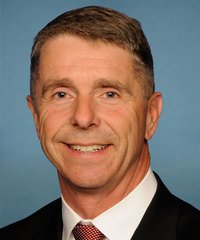
Serving the First Congressional District of Virginia since 2007, Rob has been focused on strengthening our military and supporting veterans, promoting economic development through fiscal responsibility, fixing our crumbling infrastructure, increasing access to high-speed internet, and promoting workforce development through Career and Technical Education (CTE) and Science, Technology, Engineering, and Math (STEM) programs.
In the U.S. Congress, Rob serves on the House Armed Services Committee and the Committee on Natural Resources, where he is well-positioned to represent the needs of Virginia's First District. He has quickly earned a reputation for being an advocate for our men and women in uniform and for being a champion of the Chesapeake Bay.
When I speak with Virginians, one thing I consistently hear is, "we need to change how Congress operates." People are rightly frustrated by what they see happening in Washington: budget by crisis, missing important legislative deadlines, and partisan bickering, just to name a few. I am frustrated, too. That is why I have made reforming how Congress works one of my top priorities as your representative.
Reforming how Congress works starts with passing budgets and spending bills on time. Your elected leaders must set an example by completing these most basic of tasks. But in the past, there have not been accountability measures in place to ensure the job gets done.
Responsible Budgeting
I introduced the No Budget, No Pay Act, which states that members of Congress are prohibited from receiving paychecks if their respective chamber does not pass a budget by mid-April. If the House does not pass a budget members of Congress should not be paid. Your family would not operate without a budget. Why should the federal government be any different? Clearly, it should not.
Passing Spending Bills
I also introduced what is called the Stay on Schedule Resolution. This resolution would amend House rules to prevent members of the House from taking the traditional August recess when critical spending bills remain to be passed. Failure to pass the 12 annual spending bills prevents federal agencies like the Department of Defense, Veterans Affairs, and Transportation from meeting current demands and planning for the future. Given the importance of the spending bills, members of the House should stay in Washington until they are all passed.
Pay and Benefits for Members of Congress
Congress is required by Article I, Section 6, of the Constitution to determine its own pay. Under the terms of a 1989 law, Members of Congress automatically receive an annual cost-of-living pay increase unless they act to stop it. The annual increases are based on a formula calculated by the Bureau of Labor Statistics, which takes into consideration changes in private industry wages and salaries. I strongly oppose automatic pay increases for Members of Congress and have supported legislation to block pay raises.
Social Security and Retirement Benefits for Members of Congress
All Members of Congress have been required to pay into the Social Security System since January 1, 1984, regardless of when they first entered Congress. Under current congressional retirement plans, Members of Congress are required to contribute 6.2% of their salaries to Social Security, as well as 1.3% of their full salary into the Civil Service Retirement and Disability Fund. Members of Congress are eligible for a pension at age 62 if they have completed at least five years of service. Members are eligible for a pension at age 50 if they have completed 20 years of service, or at any age after completing 25 years of service. The amount of the pension depends on years of service and the average of the highest three years of salary. By law, the starting amount of a Member's retirement annuity may not exceed 80% of his or her final salary.
Health Benefits for Members of Congress
Members of Congress and retired Members are entitled to participate in the Federal Employees Health Benefits Program (FEHBP) under the same rules as other federal employees. Members meeting minimum enrollment period requirements who are also eligible for an immediate annuity may continue to participate in the health benefit program when they retire. For an additional fee, incumbent Members can receive health care services from the Office of the Attending Physician in the U.S. Capitol; in addition, Members may purchase care from military hospitals using their FEHBP benefit. Members must also pay the same payroll taxes as all other workers for Medicare Part A coverage.